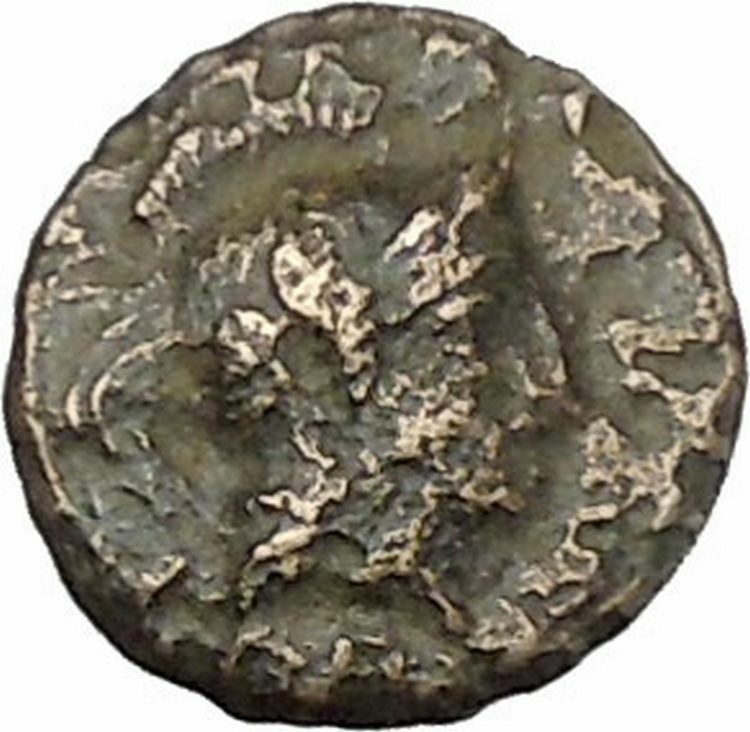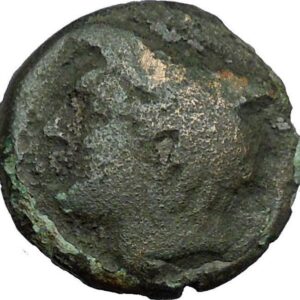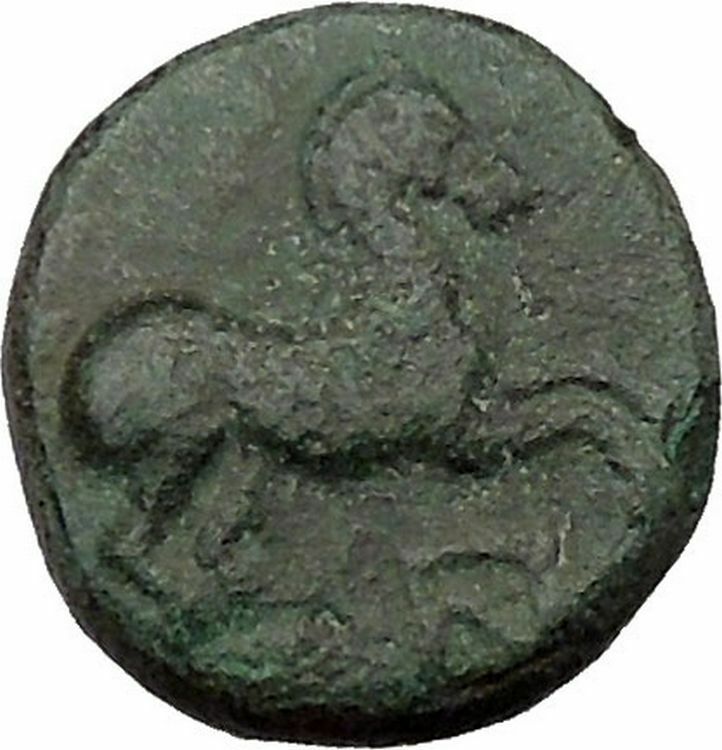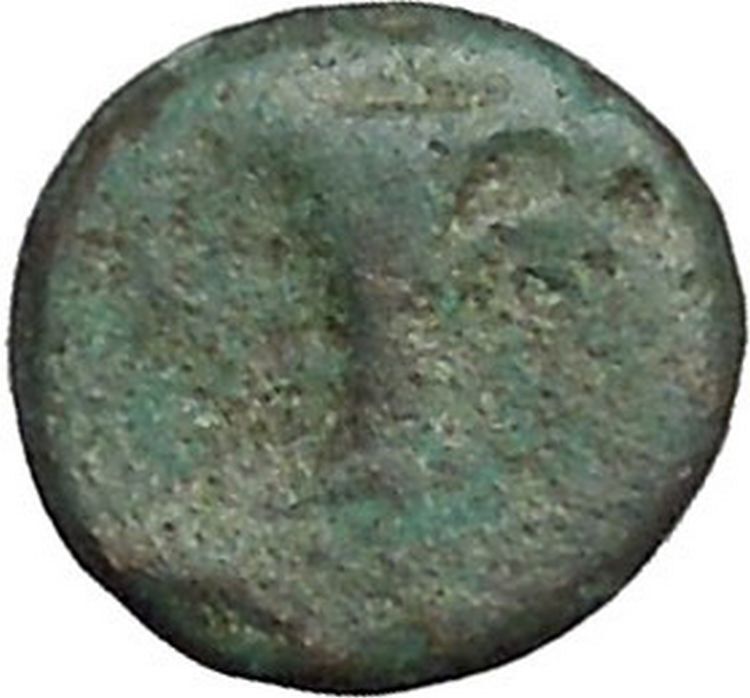|
Greek
Ptolemaic Kingdom of Egypt
Ptolemy VI Philometor – King: 180-145 B.C.
Bronze 20mm (9.04 grams) Struck 170-164 B.C.
Reference: Sear 7901; Svoronos 1426; B.M.C. 6.106,32-4
Certification: NGC Ancients Ch VF 6156465-004
Head of Zeus-Ammon right
ΠTOΛEMAIOY BAΣIΛEΩΣ, Two eagles standing left on thunderbolt, side by side; in field to left, cornucopia.
The two eagles on the reverse may be symbolic of the joint rule of Ptolemy VI and his younger brother, 170-164 B.C.
The elder of the two sons of Ptolemy V and Cleopatra I, Ptolemy VI was only about five years of age at the time of his father’s death. Cleopatra acted as regent until her death, in 176 B.C., after which the government was in the hands of two incompetent palace officials, Eulaios and Lenaios, who provoked a conflict with Antiochus IV of Syria. Later, Ptolemy VI was forced to share the throne with his younger brother, but after Roman diplomatic intervention the latter withdrew to rule Kyrenaica. Ptolemy VI married his own sister, Cleopatra II, by whom he had a son and two daughters. He died in 145 B.C. of wounds received in battle against Alexander Balas of Syria.
You are bidding on the exact item pictured, provided with a Certificate of Authenticity and Lifetime Guarantee of Authenticity.
.jpg/220px-Zeus_Ammon_(Antikensammlung_München).jpg) Zeus Ammon. Ammon was a surname of Zeus or Jupiter. The Greeks of the lower Nile Delta and Cyrenaica combined features of supreme god Zeus with features of the Egyptian god Ammon-Ra. Alexander the Great styled himself the son of Zeus-Ammon; his successors, the kings of the Seleukid Kingdom and those of Cyrenaica have, on coins, their heads adorned with the horns of a ram, or of Ammon, the symbol of their dominion over Libya. This deity appears on a great number of coins and engraved marbles. The Egyptians, for whom he was a popular divinity, regarded him as the author of fecundity and generation. The same belief was later introduced to the Romans who worshipped Ammon as the preserver of nature. Zeus Ammon. Ammon was a surname of Zeus or Jupiter. The Greeks of the lower Nile Delta and Cyrenaica combined features of supreme god Zeus with features of the Egyptian god Ammon-Ra. Alexander the Great styled himself the son of Zeus-Ammon; his successors, the kings of the Seleukid Kingdom and those of Cyrenaica have, on coins, their heads adorned with the horns of a ram, or of Ammon, the symbol of their dominion over Libya. This deity appears on a great number of coins and engraved marbles. The Egyptians, for whom he was a popular divinity, regarded him as the author of fecundity and generation. The same belief was later introduced to the Romans who worshipped Ammon as the preserver of nature.
Ptolemy VI Philometor was a king of Egypt from the Ptolemaic period. He reigned from 180 to 145 BC.
Ptolemy succeeded in 180 at the age of about 6 and ruled jointly with his mother, Cleopatra I, until her death in 176 BC. The following year he married his sister, Cleopatra II.
In 170 BC, Antiochus IV began the sixth Syrian War and invaded Egypt twice. He was crowned as its king in 168, but abandoned his claim on the orders of the Roman Senate.
From 169-164, Egypt was ruled by a triumvirate consisting of Ptolemy, his sister-queen and his younger brother known as Ptolemy VIII Physcon. In 164 he was driven out by his brother and went to Rome to seek support, which he received from Cato. He was restored the following year by the intervention of the Alexandrians and ruled uneasily, cruelly suppressing frequent rebellions.
In 152 BC, he briefly ruled jointly with one of his sons, known as Ptolemy Eupator, but it is thought that Ptolemy Eupator died that same year.
 The Ptolemaic Kingdom was a Hellenistic kingdom based in Egypt. It was ruled by the Ptolemaic dynasty which started with Ptolemy I Soter’s accession after the death of Alexander the Great in 323 BC- and which ended with the death of Cleopatra VII and the Roman conquest in 30 BC. The Ptolemaic Kingdom was a Hellenistic kingdom based in Egypt. It was ruled by the Ptolemaic dynasty which started with Ptolemy I Soter’s accession after the death of Alexander the Great in 323 BC- and which ended with the death of Cleopatra VII and the Roman conquest in 30 BC.
The Ptolemaic Kingdom was founded in 305 BC by Ptolemy I Soter, who declared himself Pharaoh of Egypt and created a powerful Hellenistic dynasty that ruled an area stretching from southern Seleukid Kingdom to Cyrene and south to Nubia. Alexandria became the capital city and a major center of Greek culture and trade. To gain recognition by the native Egyptian populace, they named themselves the successors to the Pharaohs. The later Ptolemies took on Egyptian traditions by marrying their siblings, had themselves portrayed on public monuments in Egyptian style and dress, and participated in Egyptian religious life. The Ptolemies had to fight native rebellions and were involved in foreign and civil wars that led to the decline of the kingdom and its final annexation by Rome. Hellenistic culture continued to thrive in Egypt throughout the Roman and Byzantine periods until the Muslim conquest.
|









.jpg/220px-Zeus_Ammon_(Antikensammlung_München).jpg) Zeus Ammon. Ammon was a surname of Zeus or Jupiter. The Greeks of the lower Nile Delta and Cyrenaica combined features of supreme god Zeus with features of the Egyptian god Ammon-Ra. Alexander the Great styled himself the son of Zeus-Ammon; his successors, the kings of the Seleukid Kingdom and those of Cyrenaica have, on coins, their heads adorned with the horns of a ram, or of Ammon, the symbol of their dominion over Libya. This deity appears on a great number of coins and engraved marbles. The Egyptians, for whom he was a popular divinity, regarded him as the author of fecundity and generation. The same belief was later introduced to the Romans who worshipped Ammon as the preserver of nature.
Zeus Ammon. Ammon was a surname of Zeus or Jupiter. The Greeks of the lower Nile Delta and Cyrenaica combined features of supreme god Zeus with features of the Egyptian god Ammon-Ra. Alexander the Great styled himself the son of Zeus-Ammon; his successors, the kings of the Seleukid Kingdom and those of Cyrenaica have, on coins, their heads adorned with the horns of a ram, or of Ammon, the symbol of their dominion over Libya. This deity appears on a great number of coins and engraved marbles. The Egyptians, for whom he was a popular divinity, regarded him as the author of fecundity and generation. The same belief was later introduced to the Romans who worshipped Ammon as the preserver of nature. The Ptolemaic Kingdom was a Hellenistic kingdom based in Egypt. It was ruled by the Ptolemaic dynasty which started with Ptolemy I Soter’s accession after the death of Alexander the Great in 323 BC- and which ended with the death of Cleopatra VII and the Roman conquest in 30 BC.
The Ptolemaic Kingdom was a Hellenistic kingdom based in Egypt. It was ruled by the Ptolemaic dynasty which started with Ptolemy I Soter’s accession after the death of Alexander the Great in 323 BC- and which ended with the death of Cleopatra VII and the Roman conquest in 30 BC.




